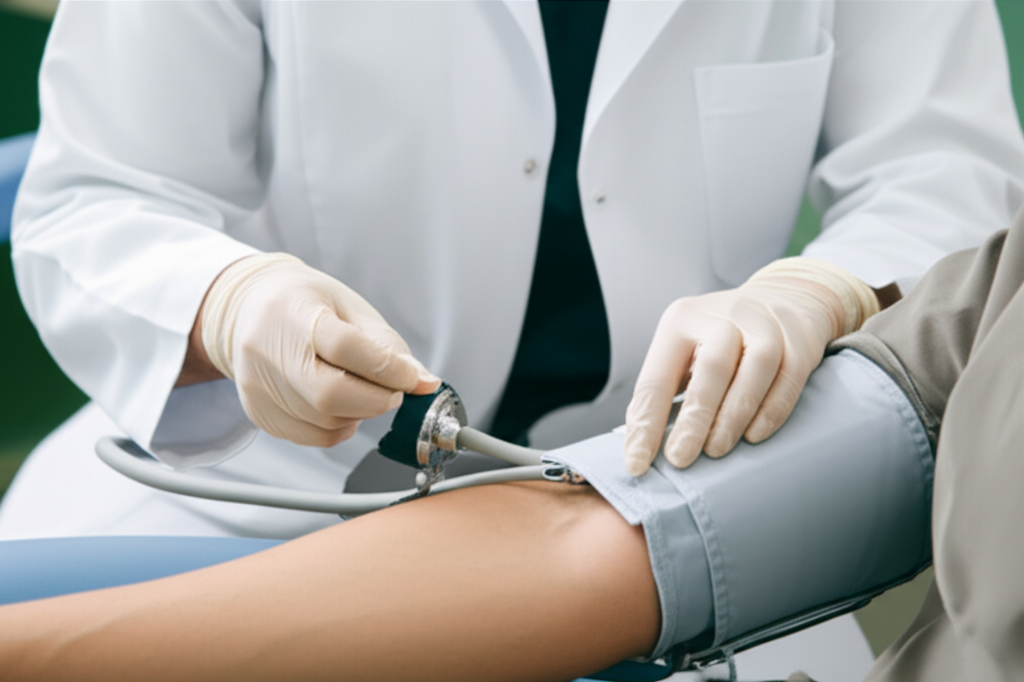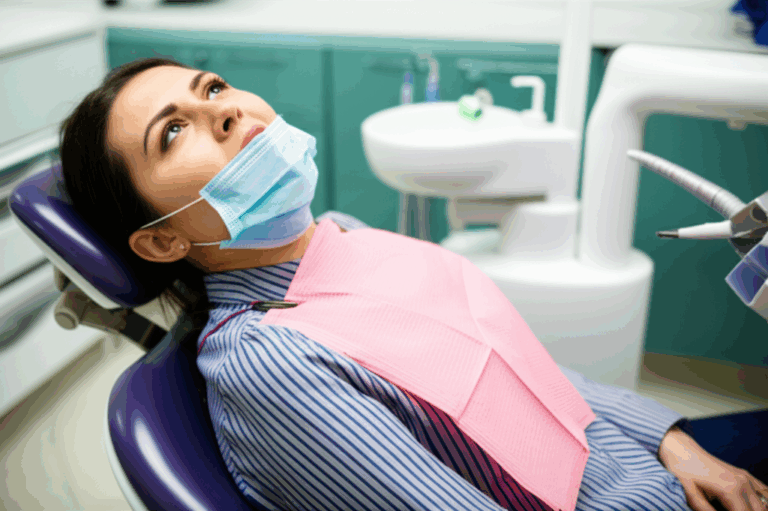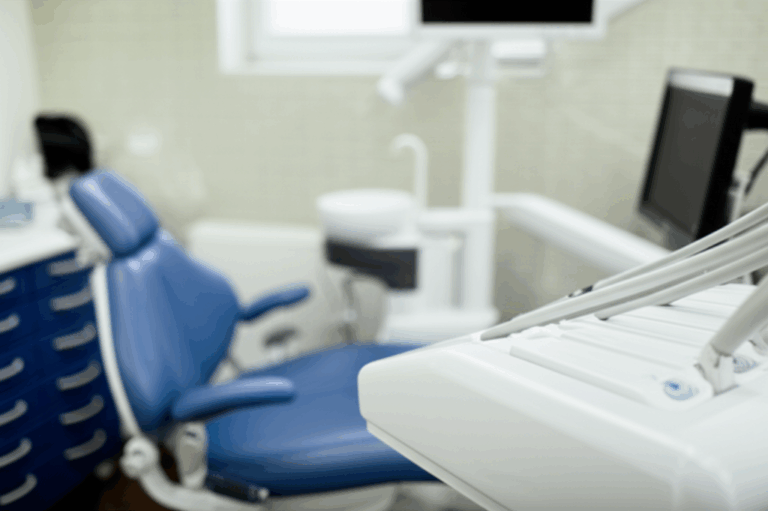
Why Your Dentist Takes Your Blood Pressure: A Crucial Step for Your Safety and Treatment
If you’ve ever sat down in the dentist’s chair, rolled up your sleeve, and watched your dentist put a blood pressure cuff on your arm, you might have wondered, “What does this have to do with my teeth?” You’re definitely not alone. Many people are surprised or maybe a little confused when the dentist checks their blood pressure. After all, isn’t that something you expect at the regular doctor’s office, not at your dental cleaning?
Let’s get to the bottom of it. Here’s why your dentist checks your blood pressure, how it affects your care, and why this quick, simple step is actually one of the most important parts of your visit. Whether you’re used to visiting the dentist or you get nervous just thinking about it, knowing the reason for this step can make your next appointment feel a little less scary—and a lot more clear.
In This Article
- The Surprising Reason Your Dentist Checks Blood Pressure
- What’s Really Going On? (The Simple Science)
- Why Blood Pressure Matters for Your Dental Care
- What If Your Blood Pressure’s High? Here’s What to Expect
- The Dental Blood Pressure Check: What Happens?
- The Oral-Systemic Health Connection
- Your Key Takeaways (Actionable Advice)
The Surprising Reason Your Dentist Checks Blood Pressure
Let’s be real: A visit to the dentist can be a little stressful. You come in for a check-up, thinking about cleanings, maybe X-rays, and a talk about flossing. Then, suddenly, there’s a blood pressure cuff. “Why does my dentist care about my heart?”
This is a very fair question. It might even seem weird if you’ve never had any blood pressure problems. Here’s the truth: Dentists check your blood pressure because your total health and your mouth are linked. It’s not just about your teeth; it’s about making sure you stay safe—especially while you’re in the dentist’s chair.
Checking blood pressure is a big safety step. Think of it like checking your car’s tires before a trip. Your car might look fine, but you don’t want to drive if something’s wrong. Your dentist is just checking for “hidden” health problems that could pop up, especially if the procedure or even the visit itself is stressful for you.
Believe it or not, lots of people find out for the first time that they have high blood pressure (hypertension) in the dentist’s office.
So, is it normal?
Yes—totally normal, and actually smart.
Let’s break it down so you can really see what’s going on, and why it matters for your whole body—not just your mouth.
What’s Really Going On? (The Simple Science)
Let’s keep it simple. Blood pressure is the strength of your blood pushing against your blood vessel walls. It has two numbers: systolic (top number, when your heart beats) and diastolic (bottom number, when your heart is resting).
- Normal: less than 120/80 mmHg.
- High (hypertension): 130/80 mmHg or higher, more than once.
Why does this matter at the dentist? Because even easy dental work—like a cleaning—can make your blood pressure go up for a little while. Fear, pain, shots, noisy drills—these can make your heart beat faster, and push your numbers up, even if you’re usually normal.
Think about it: When you get nervous, your body goes into “overdrive.” If your blood pressure is already high or jumps up fast, you’re more likely to have real problems—like a heart attack or stroke—when you least expect it.
Fast Facts
- Almost HALF of U.S. adults have high blood pressure. That’s about 116 million people, says the CDC.
- Around 20-30% of those folks don’t even know it.
- 30-50% of emergencies in dental offices are heart or blood vessel problems.
That’s huge! So by checking your blood pressure, your dentist is really just trying to keep you safe.
Why Blood Pressure Matters for Your Dental Care
1. Finding Hidden Problems
Many people feel just fine, even when their blood pressure is sneaking up. High blood pressure gives no warning until it’s really bad. So a lot of people walk around with high numbers and don’t realize it.
Dentists see people often—sometimes more than their doctors. They might be the first ones to notice your blood pressure is getting higher than it should be. That can give you a heads-up before anything bad happens.
A simple blood pressure check at your dentist might actually save you from serious health issues later.
2. Making Dental Treatments Safer
You may not think it, but dental work can stress your system—even just numbing your mouth. Local numbing shots usually have epinephrine (adrenaline) to help the medicine work longer. The problem? If you already have high blood pressure, the added adrenaline can make your heart pound or your blood pressure spike higher.
Other things matter too:
- Dental nerves: Being nervous in the chair can send your numbers up by 20–30 points.
- Big procedures: Things like tooth pulling or surgery are tougher on your body.
- Medical conditions: If you have heart, sugar (diabetes), or kidney problems, your dentist has to be extra careful.
If your blood pressure’s already high, your body is on “high alert.” This makes heart attacks, strokes, and other serious problems more likely during treatment. Nobody wants that!
Real World Example
Say you come in for a wisdom tooth pulling. The dentist plans to numb your gums with a medicine containing epinephrine. If your blood pressure’s already up, that extra adrenaline can push you into dangerous territory. If your dentist knows this in advance, they can use a different medicine, make the visit shorter, or even put off treatment if it’s not an emergency.
3. Personalizing Your Treatment
Your dentist uses the blood pressure reading to tweak your treatment—kind of like a tailor adjusting your suit.
- Slightly higher numbers: The dentist may still go ahead, just slower or without some shots.
- Very high readings (180/110 or more): They will stop, and tell you to see your doctor before any non-urgent dental work.
- Changing medicine: The dentist might skip shots with adrenaline or use a different numbing medicine.
- Shorter visits or more breaks: If your numbers are close to the limit, your dentist may suggest shorter appointments.
- Getting your doctor’s okay: Sometimes, your dentist will ask for a note from your doctor before doing anything.
4. Watching Known High Blood Pressure
If you already know you have high blood pressure and take medicine, the dentist’s check shows if you are doing well or slipping. This helps both you, your doctor, and your dentist keep track.
What If Your Blood Pressure’s High? Here’s What to Expect
It happens more than you’d think. Here’s how your dentist will handle it—and what you need to know.
1. They’ll Check Again
First, they might measure your blood pressure a second time after you’ve had a minute to relax. Sometimes, just being at the dentist (“white coat syndrome”) can bump your numbers up for a short time.
2. You’ll Talk About What It Means
If your blood pressure is a bit high, your dentist will tell you—and may suggest you see your regular doctor. They might talk about simple ways to bring it down: getting calm, eating healthier, less salt, more walks.
3. Treatment May Change or Be Delayed
- Just a bit high: Regular care usually goes on, with your dentist keeping an eye on you.
- Higher (140/90 mmHg or above): Non-urgent work might be put off until your numbers are better.
- Very high (180/110 mmHg or more): No non-emergency dental work. You’ll be told to see your doctor fast, or, if you have bad symptoms, get help right away.
4. You’ll Get a Doctor Referral If Needed
Sometimes, a dental visit is when someone finds out they have dangerous blood pressure. Your dentist is a backup safety net, and can catch problems early.
5. Emergency Care Steps
Once in a while, if you suddenly feel bad—like a bad headache, chest pain, or feeling dizzy—the dental team is trained to help during emergencies. You come first, always.
The Dental Blood Pressure Check: What Happens?
If you’re nervous, here’s what you can expect:
1. It’s Quick, Easy, and Doesn’t Hurt
A dental assistant or hygienist will put a band around your upper arm. It squeezes for a short bit, then lets go. It shouldn’t hurt. In under a minute, you’ll get your numbers.
2. It Goes Into Your Chart
Your reading gets written down with your other health and dental records. This lets your dentist spot any changes over time. If your numbers keep creeping up, it’s a good idea to talk to your doctor.
3. Routine for Everyone
Everybody gets blood pressure checked—not because the dentist thinks there’s something wrong, but to make sure everyone is treated safely.
The Oral-Systemic Health Connection
You might have heard: “Your mouth is the window to your health.” It’s more true than you think.
1. Your Teeth and Your Heart Are Linked
Years of studies show a real connection between your mouth and total health. For example, gum disease can mean a bigger chance of heart attacks or strokes.
But it works both ways. If you have high blood pressure or heart problems, you might have more gum or tooth issues. Things like swelling, poor blood flow, or some medicines can all matter.
2. Dentists as Health Helpers
Dentists see you a lot, maybe more than any other doctor. They can spot early signs—not just high blood pressure, but diabetes, sleep problems, and even some cancers.
By checking your vital signs and asking about your health, your dentist works as a real partner for all your health, not just your smile.
3. More Than Just Teeth
As we get older, our bodies connect even more. High blood pressure, diabetes, kidney problems, even being pregnant can change what goes on in our mouths. Dentists are trained to notice patterns and keep your dental visits safe.
Why Is There So Much Stress in the Dental Chair? (The Anxiety-Blood Pressure Connection)
If your blood pressure jumps up at the dentist, you’re far from alone. Dental anxiety is very common, and it’s normal for your body to react with a blood pressure jump. Many people’s top number can go up by 20 to 30 points during a visit.
Tips That Help:
- Tell your dentist how you feel: They want to help you, and it’s okay to say you’re nervous.
- Try slow, deep breaths: Breathing slowly can lower your numbers while you’re there.
- Ask about ways to relax: Lots of dental offices have music, cozy blankets, or even sedation for those who need it.
- Bring someone with you: Sometimes, having a friend or family member there helps you chill out.
If you’re super anxious, there are even digital dental lab tools (see digital dental lab) that make treatment faster and often easier.
Table: Key Data and What It Means for You
| Data Point | What It Means for You |
|---|---|
| Nearly 50% of adults have hypertension | Even if you feel healthy, you could be at risk—your dentist’s check could catch problems early. |
| 20-30% with high BP don’t know it | A routine dental visit could be the first clue you need more attention. |
| 30-50% of dental office emergencies = heart | Pre-screening lets your dentist spot and prevent emergencies before they even start. |
| Dental anxiety = 20-30 mmHg BP spike | Feeling nervous is normal, but that jump is why checks are important—keep you safe. |
| Safe BP for treatment: below 180/110 mmHg | If your numbers are above that, it’s safer to postpone and see your doctor. |
Your visit isn’t just about stopping dental problems—it’s about keeping your whole body healthy!
Blood Pressure in Different Dental Situations
Let’s look at some special cases where the blood pressure check is extra important:
Oral Surgery (Like Wisdom Tooth Removal)
Big dental jobs stress your body more. Watching your blood pressure helps keep problems like bleeding or heart troubles from happening.
Use of Local Anesthetics
Some numbing shots have epinephrine. For those with high blood pressure, dentists may use other medicines or lower the dose.
Ongoing Conditions (Diabetes, Kidney Problems, Pregnancy)
If you have health problems that change your blood pressure, your dentist adjusts your care. It matters if you’re dealing with a few health issues at once.
And yes—if you’re pregnant, blood pressure checks matter even more, since both high blood pressure and gum issues can affect you and your baby.
Age Differences
- Older adults: Blood pressure often gets higher as we age, so checks help prevent trouble in seniors.
- Kids: Not as common, but some children with heart or kidney issues need extra watching.
Fine-Tuning Your Dental Work: All About Customization
Did you know? Every mouth is different—and so is every dental plan. Depending on your blood pressure and needs, your dentist may:
- Pick different materials for crowns, bridges, or dentures (learn more at crown and bridge lab)
- Use quick methods to make your visit faster and easier
- Work with a china dental lab if special materials are needed—especially if you have medical issues
Bottom line: Your comfort and safety always come first.
Empowering You: Your Key Takeaways for Dental Health and Blood Pressure
Let’s finish with simple steps you can use.
It’s not about blaming you. It’s a fast, easy way to spot issues so your visit goes well.
Knowing your numbers helps your dentist make smart choices for numbing, treatments, and your comfort.
If you don’t know your usual blood pressure, check it at a pharmacy or home, and tell your dentist about all medicines and health updates.
See your doctor, follow advice, and remember: Good blood pressure helps your heart and your teeth.
Your dentist wants you to feel okay. Let them know so they can help.
Regular dental check-ups can find more than cavities—they give clues about your overall health.
Frequently Asked Questions
Q: I’m healthy. Why do I need my blood pressure checked at the dentist?
A: Because high blood pressure doesn’t show symptoms! Even if you feel great, you might not know you have a problem. Early checks help.
Q: Can high blood pressure keep me from getting dental treatment?
A: Sometimes, yes—if it’s really high (above 180/110 mmHg). Your dentist may wait and send you to your doctor first.
Q: What if I get nervous at the dentist? Will that mess up my reading?
A: It’s normal for your numbers to go up at the dentist. That’s why your team might check again after you relax.
Q: Will I need to do anything different if I have high BP?
A: Your dentist may change numbing medicines, shorten long visits, or check with your doctor first. It’s all about keeping you safe.
Q: How does my dentist use my blood pressure reading?
A: They may change the plan, slow things down, watch you extra close, or ask your doctor for advice before starting.
Your Healthy Smile, Backed by Science
Next time your dentist checks your blood pressure, you’ll know what’s happening—and why it matters for you. It’s just another way your dental team looks out for your overall health.
Remember: A great dental visit is about more than clean teeth. It’s about keeping your whole body safe, step by step. If you haven’t had your blood pressure checked lately or if you’re curious how it affects your dental care—just ask!
Your health is worth it.
Medically reviewed by leading oral health experts. For more tips on keeping your teeth and your whole self healthy, check out our full practical guide or book a visit with one of our helpful professionals.
Key Resources:
- American Dental Association (ADA)
- American Heart Association (AHA)
- Centers for Disease Control and Prevention (CDC)
And don’t forget: Your next dental visit might be the health check you didn’t know you needed.








